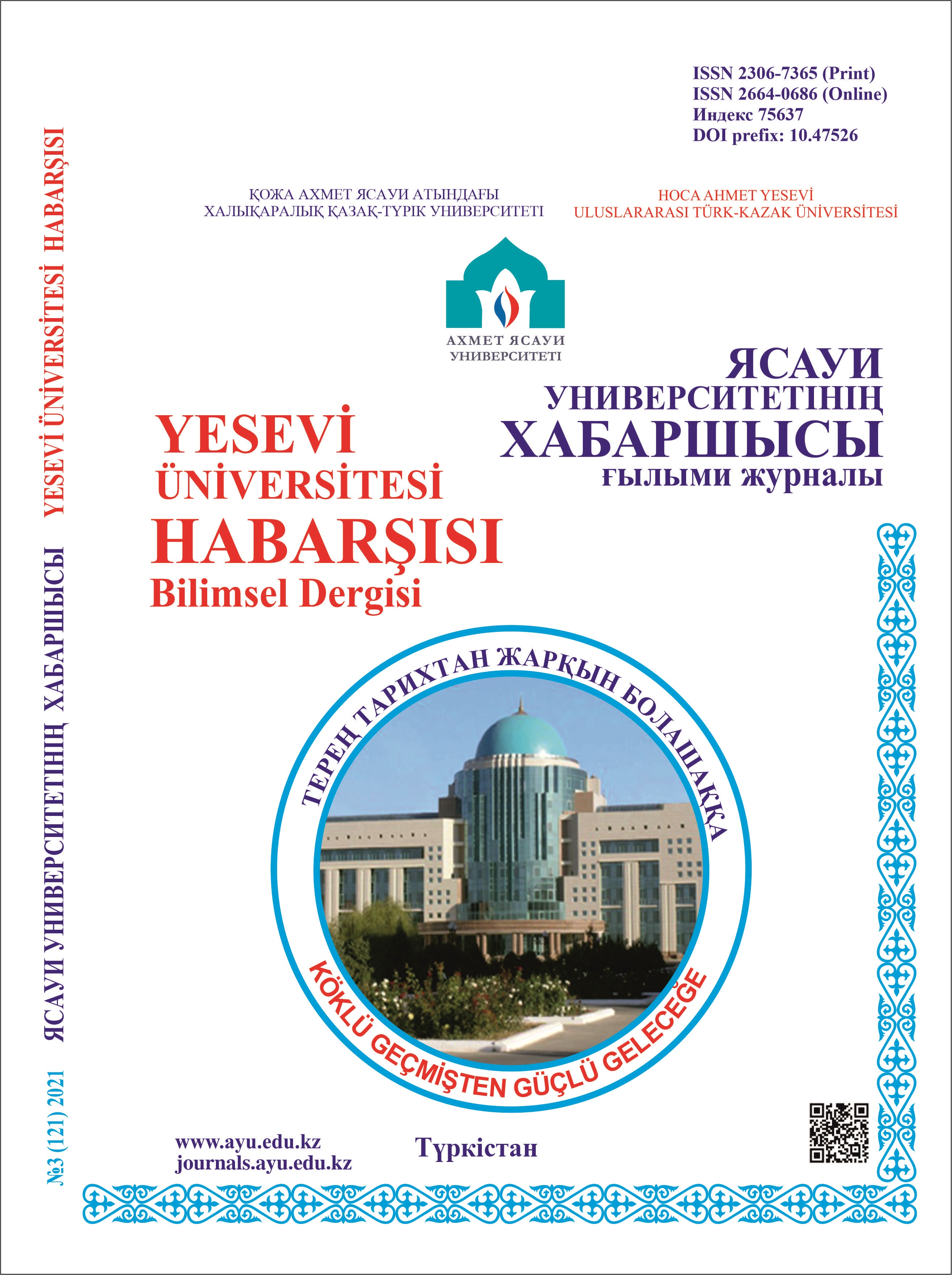BUILDING INTERCULTURAL COMMUNICATIVE COMPETENCE: REFLECTIONS FROM A KAZAKHSTANI SCHOLAR IN THE USA
202 127
Keywords:
Intercultural Communicative Competence, auto-ethnography, academic exchange, cultural adaptation, international scholars, experiential learning.Abstract
This auto-ethnography explored the development of intercultural communicative competence (ICC) during a one-year internship at Michigan State University (MSU) in the USA, undertaken by a visiting scholar from Kazakhstan. The auto-ethnography study investigated how navigating the academic and social environment of the United States aided in the development of intercultural communicative competence through reflective analysis of personal narratives and intercultural encounters. The auto-ethnographic method placed these experiences within the larger framework of ICC theory while highlighting significant instances of cultural learning, adaptation, and conflict resolution. The auto-ethnographic approach highlighted key moments of cultural knowledge, adaptation, and conflict resolution while situating these experiences within the broader framework of intercultural communication theory. This article provided insights into the lived experiences of international scholars, contributing to a deeper understanding of how academic exchange programs foster intercultural communicative competence.
The reflective journey captured in this study emphasized the role of experiential learning in adapting to diverse communicative practices and managing cultural misunderstandings. The study demonstrated how immersion in an academic setting overseas challenges and enhances one’s identity as a communicator and learner through everyday encounters with American professors, students, and colleagues.
The analysis of these interactions revealed how moments of discomfort and cultural difference can catalyze ICC development. Additionally, the study addressed the impact of cultural self-awareness, examining how the scholar’s Kazakhstani background influenced their perception and response to the American social and academic landscape. Lastly, this auto-ethnography study emphasized the value of institutional resources and encouraged mentorship in promoting fruitful cross-cultural interactions, highlighting the transformative potential of international academic mobility.
Moreover, findings reveal key moments of cultural adaptation, communication challenges, and identity negotiation. The study highlights the role of mentorship, institutional resources, and experiential learning in facilitating intercultural competence. It provides practical recommendations for host institutions, international scholars, and academic programs to enhance cross-cultural exchange experiences. The implications extend to the design of international mobility programs that support scholars’ adaptation and professional growth.
References
REFERENCES
Byram M. Teaching and assessing intercultural communicative competence. – Multilingual Matters, 1997. – 124 p.
Ward C., Kennedy A. The measurement of socio-cultural adaptation // International Journal of Intercultural Relations. – 2019. – №43(4). – P. 659–689.
Anderson L. (2020). Reflexivity in international education: Developing cross-cultural competence // Journal of Intercultural Relations. – 2020. – №43(3). – P. 235–256.
Anderson L. Reflexivity in international education: Developing cross-cultural competence // Journal of Early Childhood Teacher Education. – 2018. – №39 (4). – P. 364–381.
Gareis E. Intercultural friendships and adaptation: A longitudinal perspective // Routledge. Intercultural Relations. – 2021. – №37(3). – P. 235–246.
Gareis E. Intercultural friendship: Effects of home and host region on intercultural friendship formation of international students // Journal of International and Intercultural Communication. 2012. – №5(4). – P. 309–328. https://doi.org/10.1080/17513057.2012.691525
Berry C. Intercultural communication and identity: An autoethnography of a visiting scholar in the USA // Journal of International and Intercultural Communication. – 2015. – №8(3). – P. 221–238. https://doi.org/10.1080/17513057.2015.1057900
Jackson J. Globalization, internationalization, and short-term stays abroad // International Journal of Intercultural Relations. 2008. – №32(4). – P. 349–358. https://doi.org/10.1016/j.ijintrel.2008.04.004 9. Ellis C., Adams T.E., Bochner A.P. Autoethnography: an overview // Historical social research/Historische sozialforschung. – 2011. – Vol. 12, №1. – P. 273–290.
Anderson L. Analytic autoethnography // Journal of Contemporary Ethnography. – 2006. – №35(4). – P. 373–395. https://doi.org/10.1177/0891241605280449 11. Denzin N.K. Interpretive autoethnography. – Sage Publications, 2013.
Bourke B. Positionality: Reflecting on the research process. The Qualitative Report. – 2014. – №19(33). – P. 1–9.
Canagarajah A.S. Teacher development in a global profession: An autoethnography // TESOL Quarterly. – 2012. – №46(2). – P. 258–279. 14. Farrell T.S.C. Reflective practice in ESL teacher development groups: From practices to principles. – Palgrave Macmillan, 2013. – 161 p.
Hoff H.E. A critical discussion of Byram’s model of intercultural communicative competence in the light of Bildung theories // Intercultural Education. – 2014. – №25(6). – P. 508–517. https://doi.org/10.1080/14675986.2014.992112
Riessman C.K. Narrative Methods for the Human Sciences. – SAGE, 2008. – 251 p.
Chase S.E. Narrative inquiry: Still a field in the making. In: N.K. Denzin, Y.S. Lincoln (Eds.). The SAGE Handbook of Qualitative Research. – London: SAGE, 2011. – P. 421–434.
Braun V., Clarke V. Using thematic analysis in psychology // Qualitative Research in Psychology. – 2006. – №3(2). – P. 77–101.
Montgomery C. Understanding the international student experience: Bridging the cultural divide // International Education Journal: Comparative Perspectives. – 2010. – №9 (1). – P. 31–50. 20. Kim Y.Y. Becoming intercultural: An integrative theory of communication and cross-cultural adaptation. – Sage Publications, 2001. – 207 p. 21. Duisembekova Z. Exploring ELT Student Teachers’ Beliefs about ICC: Insights from Teacher Education Programs in Turkey // Iasaui universitetinin habarshysy. – 2021. – №4(122). – P. 107–119.
Hofstede G. Culture's consequences: International differences in work-related values. – SAGE, 1984. – 327 p.
Dervin F. Interculturality in education: A theoretical and methodological toolbox. – Springer, 2016. – 117 p.
Marginson S. Higher education, globalization, and inequality: Problems and prospects. – Cambridge University Press, 2017.
Ryan J., Viete R. Respectful interaction: Learning with international students in the English-speaking academy // Teaching in Higher Education. – 2009. – №14(3). – P. 303–314.
Bandura A. Self-efficacy: The exercise of control. – W.H. Freeman, 1997. – 591 p.
Dervin F. Interculturality in education: A methodological approach. – Springer, 2022. – 100 p.

